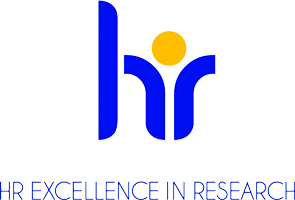
- This event has passed.
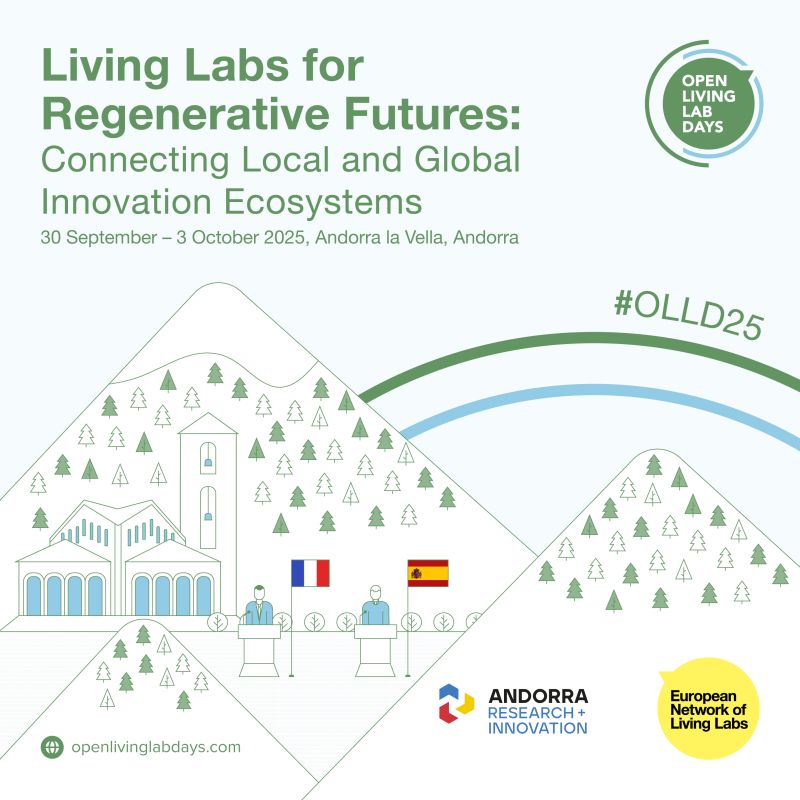
i2CAT at OpenLivingLab Days 2025: Co-creating the Future in Andorra
September 30 // October 3
We are pleased to participate once again in the annual flagship event of the European Network of Living Labs (ENoLL). OpenLivingLab Days (OLLD) brings together researchers, corporate leaders, entrepreneurs, and innovators from around the world to exchange best practices, enhance projects, and co-create solutions for a more sustainable and regenerative future.
This year, the event will take place in Andorra la Vella from September 30 to October 3, with a unique and innovative approach: the entire country will serve as a Living Lab. Andorra itself will become a dynamic testing ground for innovation, providing an unprecedented opportunity to experiment and collaborate in a real-world environment.
Our Contribution to OLLD 2025
As a prominent member of ENoLL, we will be present at OLLD 2025 through our Digital Society Technologies research team. We are delighted to showcase projects and practical experiences that apply the Living Lab methodology to address key social and technological challenges.
Our objective is to share our accumulated knowledge, learn from global best practices, and establish new collaborations to continue driving innovation with a tangible impact on society.
Check the detailed programme
1 October
11:00 – 12:15 – Digital tools for regenerative planning: Urban Living Labs driving systemic change – More information
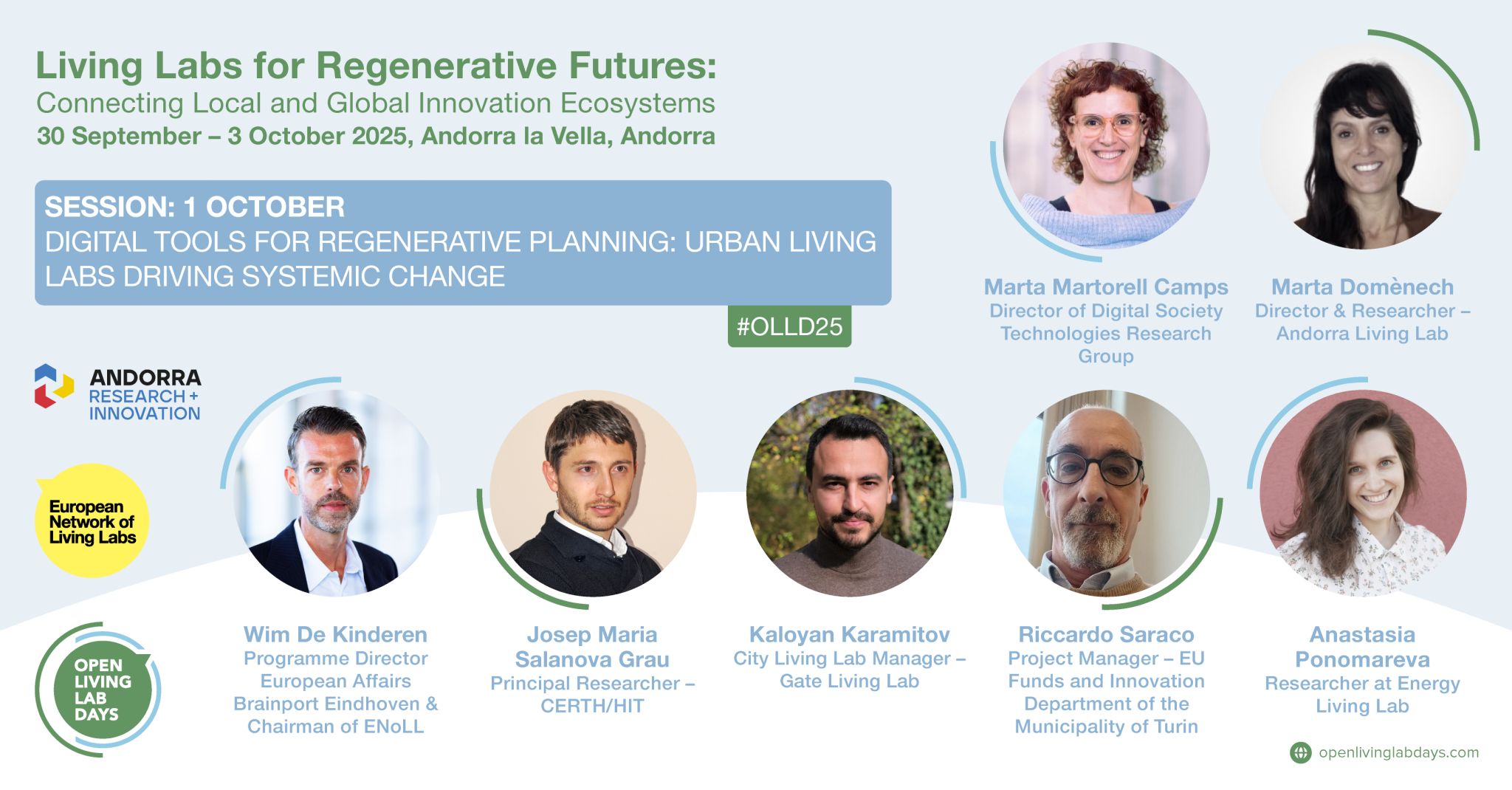
This session will explore how digital tools empower regenerative planning through Living Labs, helping urban and regional ecosystems tackle societal challenges. Using real examples, we’ll examine how co-creation, inclusiveness, and systems thinking are supported by digital solutions, creating value for the ecosystem and connecting local innovation to global regenerative transformation.
With the participation of Marta Martorell, Director of Digital Society Technologies Research Group
15:45 – 17:00 – Empowering Everyone to Innovate through Living Labs in Education: Stories and Structures of Change – More information
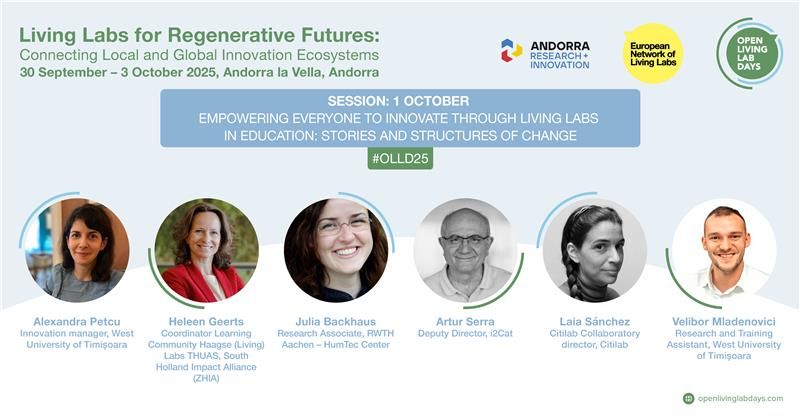
This session explores the central question: How can Living Lab methodologies empower learners and educators to drive systemic innovation in education? The session aims to inspire, connect, and mobilize actors across educational systems by presenting diverse innovation stories from schools, higher education institutions, and vocational training centers that have embedded Living Lab principles in their practice.
Experience escape rooms as a powerful co-creation tool through the LiCalab case, where complex topics are presented in a playful, engaging way. We’ll explore how gamification fosters collaboration and deeper understanding, highlighting its potential for innovation across various contexts.
With the participation of Artur Serra, Deputy Director
11:00 – 12.30 – Innovation with Purpose: Embedding Values into Living Labs for Sustainable Impact – More information
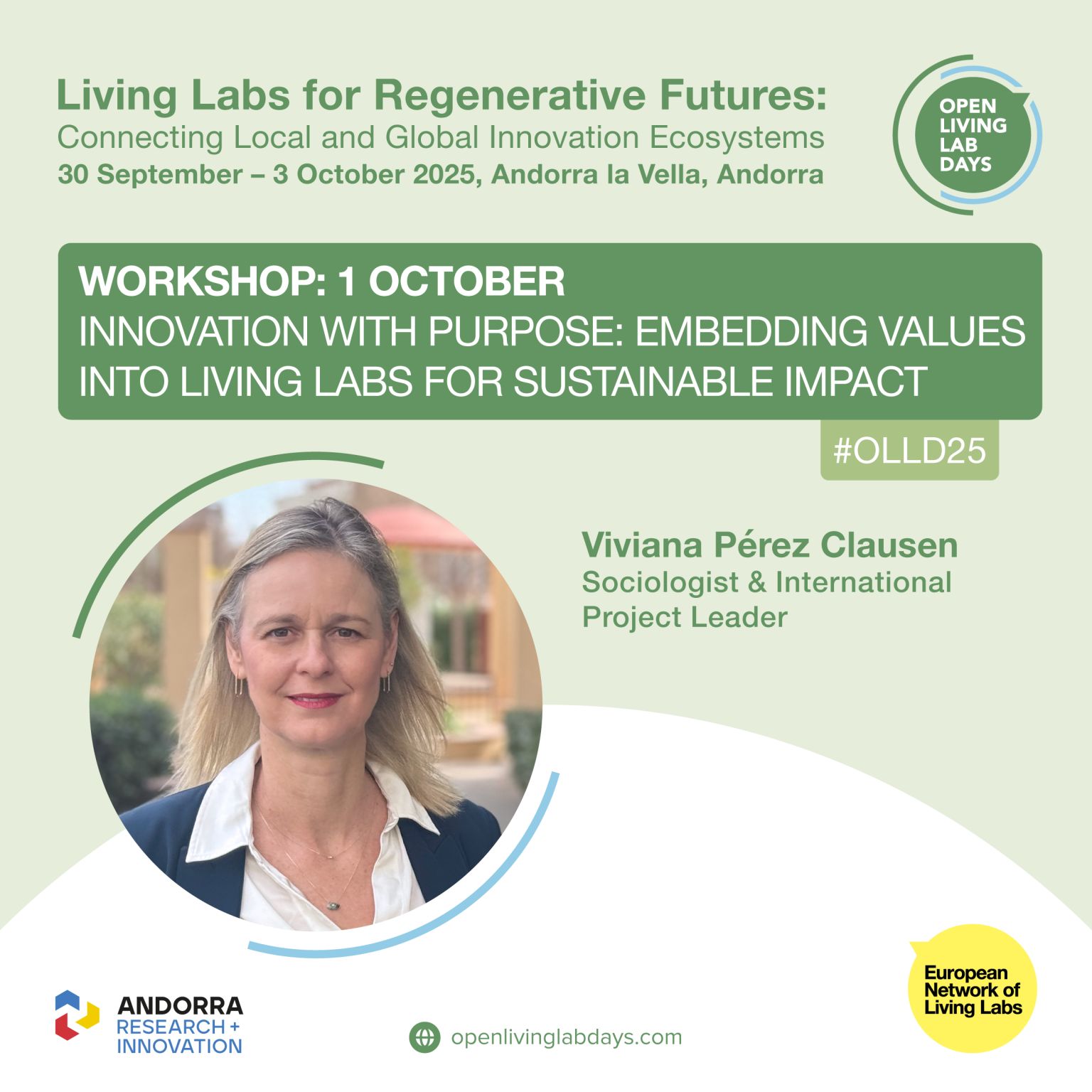
Living Labs excel at user-driven innovation, but the next challenge is to evolve into value-driven ecosystems. This interactive session explores the shift from Key Performance Indicators (KPIs) to Key Value Indicators (KVIs), embedding societal, environmental, and ethical priorities at the heart of innovation.
Participants will gain insights from experts and real-world cases, including the Interiors Living Lab (AMBIT Cluster) and the Alimara Living Lab (CETT Barcelona), where KVIs are being applied to integrate sustainability, wellbeing, and social inclusion into practice. The session will also highlight how values such as inclusiveness, trust, sustainability, and digital rights can be operationalized through governance, business models, and partnerships.
Combining strategic perspectives, keynotes, and hands-on co-creation, participants will work together to define actionable KVIs for their own contexts. They will leave with practical tools and a shared vocabulary to bridge the gap between innovation and values—redefining success from outputs to outcomes that matter for society, funders, and policy frameworks such as the Digital SDGs and the Green Deal.
With the participation of Viviana Pérez Clausen, Senior Innovation Project Manager
2 October
11:00 – 12.15 – Living Labs 2.0: Shaping EU Transition Regions for a Regenerative Future through Cross-sectorial Open Innovation, Shared Agendas, Capacity Building, and Digitalisation – More information
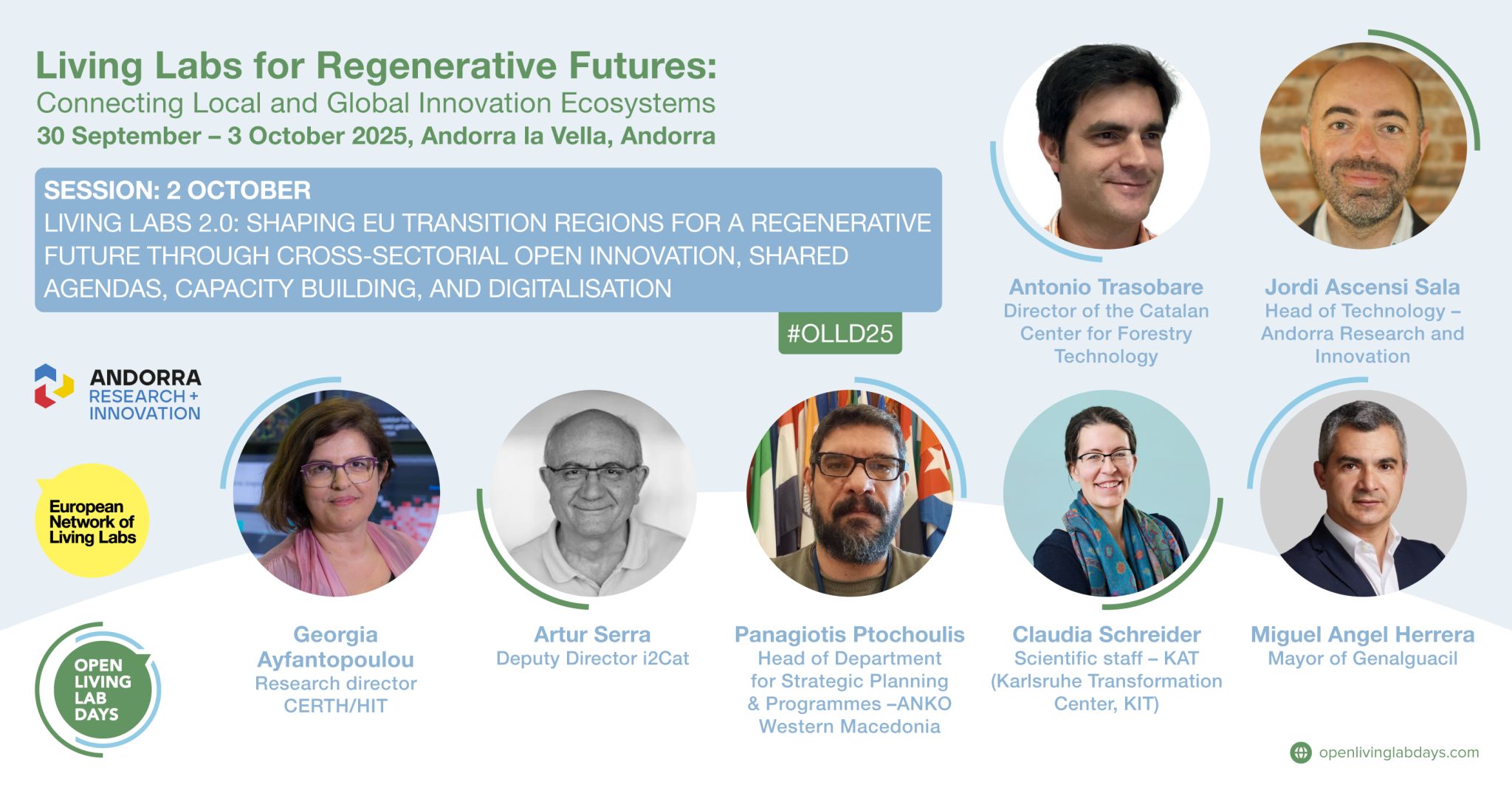
This session explores how Living Labs can evolve from isolated, sector-specific initiatives into integrated, cross-sectoral regional ecosystems driving systemic, regenerative change: ecologically, socially, and economically. It addresses key questions: How can Living Labs become engines of long-term regional transformation? What forms of collaboration, governance, and capacity-building are needed to break silos and scale impact? Participants will be inspired by real-life cases where Living Labs moved from pilots to systemic change drivers. Together with speakers and the audience, the session will explore the structural, policy, and financial innovations needed to embed Living Labs in thriving regional ecosystems. Aimed at practitioners, planners, researchers, policymakers, and civil society actors in sustainability and innovation, the session features short speaker inputs, a moderated panel discussion, and interactive tools like live polls and Q&A. This format encourages reflection and shared learning, linking local innovation to broader regenerative transitions our societies urgently need.
With the participation of Artur Serra, Deputy Director
11:00 – 12:30 – Assessing the Impact of Responsible Digital Social Innovation: The Case of the Digital Living Lab of Catalonia – More information
Living Labs (LLs) are collaborative ecosystems designed to address complex social and environmental challenges through multi-stakeholder participation. The Collaboratory Catalunya project, launched by the Catalan government in 2019, aims to establish a regional digital LL by applying the LL methodology within an Internet-based innovation ecosystem.
This study assesses the effectiveness, impact, and transformative potential of the project across Catalonia (Spain), based on surveys and semi-structured interviews with Quadruple Helix stakeholders. The results show positive effects on cross-sector collaboration, the promotion of distributed Digital Social Innovation (DSI), and the acceleration of digital transformation in public and private organisations.
The project is an example of Responsible DSI (RDSI), which uses Information and Communication Technologies (ICTs) to address societal challenges while promoting inclusion, ethics, and public value. In addition, it also provides valuable insights into how regional digital LLs can foster systemic and responsible innovation, and highlights the role of public administration in facilitating co-creation and influencing public policy. However, the project shows that long-term success requires more sustainable frameworks and broader thematic coverage.
With the participation of Fàtima Canseco, Social Innovation Senior Researcher
14:00 – 15:15 – From local action to global transformation: How Living Labs are supporting the digital transformation in Africa – More information
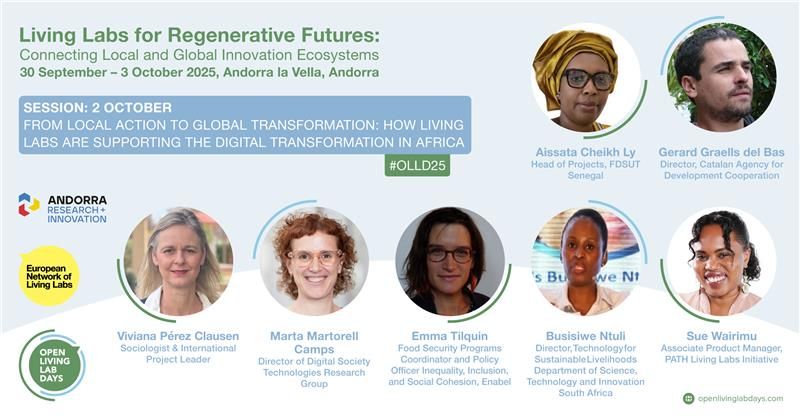
This session explores how Living Labs can empower local communities to drive their own digital and social transformation. Focusing on concrete experiences from Senegal and South Africa experience, it shows how these Living Labs can be platform for inclusive innovation, fostering locally-driven solutions that can address both community needs and digital challenges. These two countries act as precursors of scalable, context-sensitive models that can inform wider strategies for equitable and sustainable development across Africa and beyond. The discussion aims also at reflecting on how Living Labs can support long-term cooperation between AU and EU, ensuring that the digital transformation is not only technologically sound but also socially grounded and locally owned.
With the participation of Marta Martorell, Director of Digital Society Technologies Research Group, and Viviana Pérez Clausen, Senior Innovation Project Manager
15:45 – 17:00 – Reframing Impact: Key Value Indicators for Living Labs and Social Innovation – More information
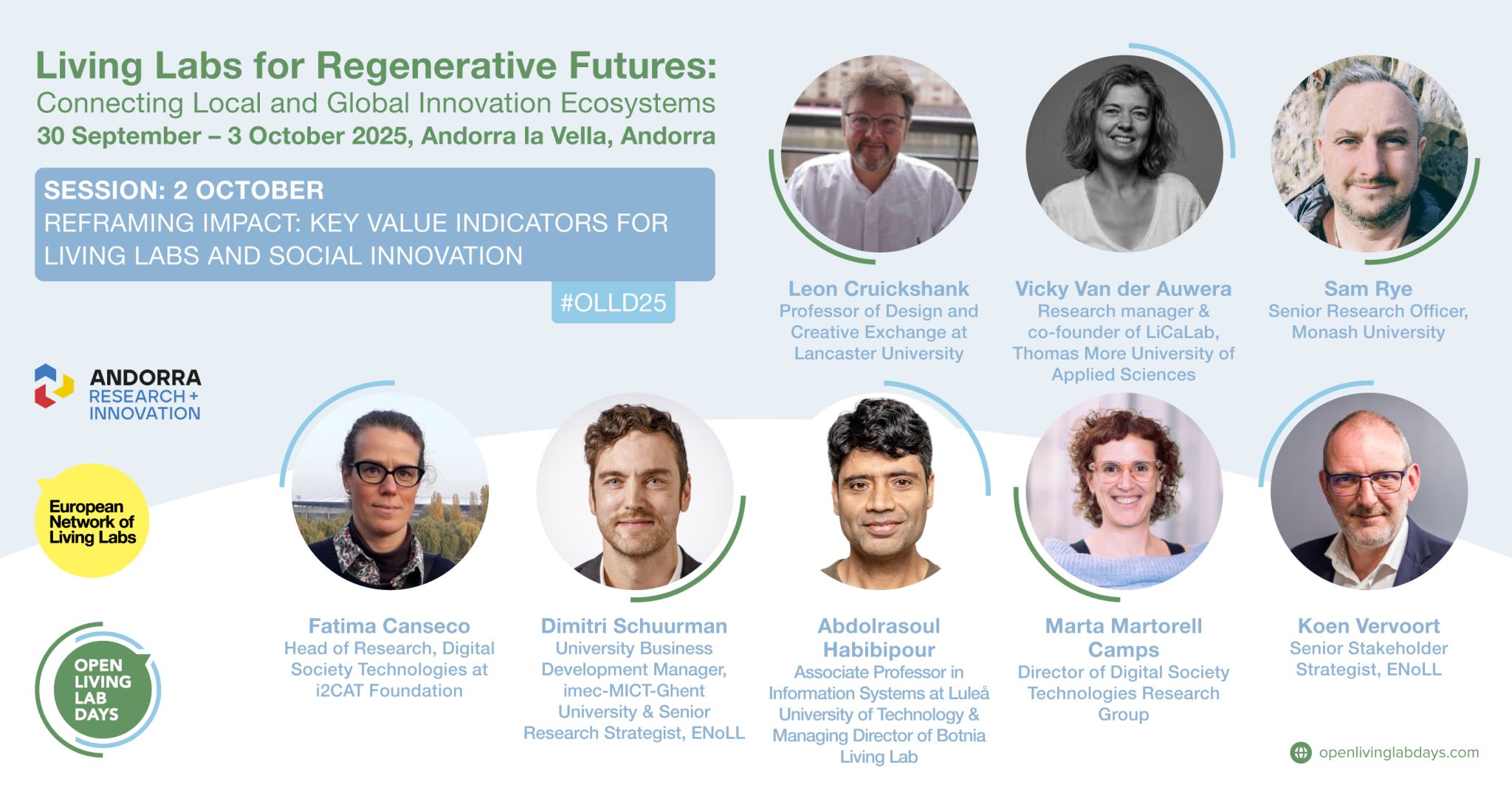
Living Labs have become fundamental ecosystems for driving innovation in real-world contexts. According to ENoLL (2024), they are defined as open innovation ecosystems in real-world environments based on a systematic approach to co-creation with users that integrates research and innovation activities in communities and/or multi-stakeholder environments, placing citizens and/or end users at the centre of the innovation process.” The European Union (EU) promotes this model through initiatives such as EU Missions, in which researchers, governments, companies, and citizens collectively commit to addressing ambitious and measurable social/societal challenges (European Commission, 2024).
Within this framework, Social Innovation (SI) and Digital Social Innovation (DSI) emerge as key mechanisms for addressing complex social/societal and environmental needs (Lettice and Parekh, 2010; Parth et al., 2021). However, current methods for evaluating the impact of DSI and LLs remain largely focused on KPIs, which carries the risk of providing a limited narrow and incomplete picture of actual social/societal transformation. It is no longer enough to measure results; we must capture systemic change, community empowerment, environmental sustainability, and ethical governance. This session will explore: The limitations of quantitative indicators when the impact of DSI. The need to design new qualitative approaches and mixed methods. The proposal and application of Key Value Indicators (KVIs) to incorporate social/societal, environmental, and ethical values in LL ecosystems. Through sharing the experiences and knowledge of experts, and through joint discussion, the session aims to jointly open up new perspectives for evaluating transformation beyond traditional metrics.
With the participation of Fátima Canseco, Social Innovation Senior Researcher


